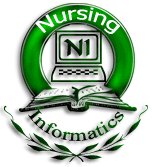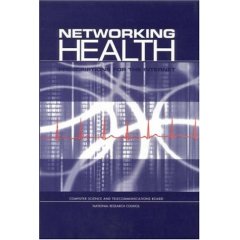| P A G E 3 |
NI News | Winter 2008 |
CE Courses in Nursing Informatics
|
 All courses have been painstakedly developed to reflect a 21st century, techno-savvy, theory-rich lens of Nursing Informatics. Content is presented using a wide-angle, global lens to help nurses develop keen insight and awareness of all ramifications of the informatics spectrum of health care. A constructivist, project-rich, learner-centered mode of teaching and learning is applied to provide content that both challenges and stimulates learners to engage with the many faces of informatics in meaningful ways.
These completely on-line, self paced courses are approved by the California Board of Nursing for full CE credit; CE Provider No. CEP 14891. VERIFY LICENCE HERE. Most State & Country licencing Boards accept CE credit approved by other State Boards.

VIEW LIST OF STATE & COUNTRY CE EQUIVALENCIES
Courses range from short 3 contact hour courses to 39 contact hours. The 39 contact hour courses are intensive - you will definitely become immersed in the theory and practice of nursing informatics, from a global perspective. Course Tuition is ranges from $20 to $199 USD. Learn more about the Curriculum Designer/Facilitator, June Kaminski....
NRPR 101: Nursing Informatics Fundamentals
This 13 module course introduces the practicing nurse to nursing informatics theory, practice applications, self-assessment and skill development for the future. A great preparation for those thinking of seeking NI certification. 39 contact hours - $199 tuition.
NRPR 102: Human Factors in Nursing Informatics
This 3 hour course introduces nurses to human factors essential to effective application of nursing informatics in practice. Topics focus on the human factors of ergonomics, human-computer interaction, usability, learnability, memorability, likeability, readability, asepsis, and aesthetics. This course has been designed for prepare nurses to meet the requirements of various certification programs, e.g. Topic II: Human Factors. 3 contact hours - $20.
NRED 100: Virtual Education in Nursing: Basic Level
This 13 module course introduces nursing educators to basic theory, pedagogy, applications, dynamics and the process of web development and teaching nursing in the virtual environment. Perfect for educators and nurses heavily involved with client teaching. 39 contact hours - $199 tuition.
NRED 103: Nursing Informatics in the Classroom
This 13 module course introduces nursing educators and students to the theory, application, technical skills and process of integrating nursing informatics into nursing education and practice. Perfect for educators in academia and clinical areas. 39 contact hours - $199 tuition.
NRED 200: Virtual Education in Nursing: Intermediate Level
This 13 module course provides nursing educators with advanced theory, pedagogy, applications, dynamics and process activities for advanced web development and teaching nursing in the virtual environment. Perfect for educators and nurses heavily involved with client teaching. 39 contact hours - $199 tuition.
NRBU 100: Web Presence for Nursing Businesses
This 13 module course introduces self-employed nurses and nurses wishing to provide health related web sites on the internet to the theory, application, ethics, and process of creating web sites for business and patient education. 39 contact hours - $199 tuition.
NRRS 100: Qualitative Research and Technology
This 13 module course introduces nurses to the theory and process of applying technology to qualitative nursing research: including software, virtual databases, proposal writing, online data collection and computer-assisted data analysis and dissemination. 39 contact hours - $199 tuition.
NRRS 105: Quantitative Research and Technology
This 13 module course introduces nurses to the theory and process of applying technology to quantitative nursing research: including software, virtual databases, proposal writing, online data collection and computer-assisted data analysis and dissemination. 39 contact hours - $199 tuition.
|
|
| Free to Read E-Book Recommendation |
Networking Health: Prescriptions for the Internet
|

An Analysis on how the Internet influences Health Care Provision and Experiences
Consumer health websites have garnered considerable media attention, but only begin to scratch the surface of the more pervasive transformations the Internet could bring to health and health care. Networking Health examines ways in which the Internet may become a routine part of health care delivery and payment, public health, health education, and biomedical research.
Despite its promise, the Internet's future in supporting health and health care is far from assured. A number of technical, organizational, and policy barriers stand in the way of its adoption by health organizations and consumers.
Buy the printed version from Amazon!
|
Introduction
The Internet is rapidly and radically transforming many aspects of society, reshaping industries from aircraft manufacturing to retailing by enabling the widespread sharing of information and creating new relationships between buyers and sellers of goods and services. Businesses now sell goods and services over the Internet, often dealing directly with customers rather than working through traditional distribution channels and intermediaries, tailoring products to match more closely the preferences of individual customers. Governments disseminate public information on World Wide Web sites, and consumers use the Internet to find information, communicate with friends and family, plan trips, shop, and pursue hobbies. Both the scope of applications and the number of Internet users will undoubtedly continue to grow as technologies improve and innovators continue to experiment with new online applications.
Health-related activities stand to benefit enormously from the Internet. As a highly information-intensive set of functions characterized by complex interactions among a large number of stakeholders—primary care physicians, specialists, nurses, patients, health plan administrators, public health officials, medical librarians, researchers, and others—health-related activities can take advantage of the nearly ubiquitous reach of the Internet and its capability to support communication between users who may not have interacted with each other before. Already the Internet is beginning to influence the health sector by forging new relationships among stakeholders and improving access to health information.
to page 4 |
|
|
|
|